
Heracleum is a genus of biennial and perennial herbs in the carrot family Apiaceae. They are found throughout the temperate northern hemisphere and in high mountains as far south as Ethiopia. Common names for the genus or its species include hogweed and cow parsnip.

Azorella is a genus of flowering plants in the family Apiaceae, native to South America, New Zealand, southeastern Australia, and the islands of the Southern Ocean.

Arenaria is a genus of flowering plants, within the family Caryophyllaceae.

Lomatium is a genus in the family Apiaceae. It consists of about 100 species. Its common names include biscuitroot, Indian parsley, and desert parsley. It is in the family Apiaceae and therefore related to many familiar edible species such as carrots and celery. Native to western Northern America and northern Mexico, some Lomatium species are extensively used by Native Americans in the inland Pacific Northwest as a staple food.
Austropeucedanum is a monotypic genus of flowering plants in the family Apiaceae. Its only species is Austropeucedanum oreopansil. It is endemic to Argentina.
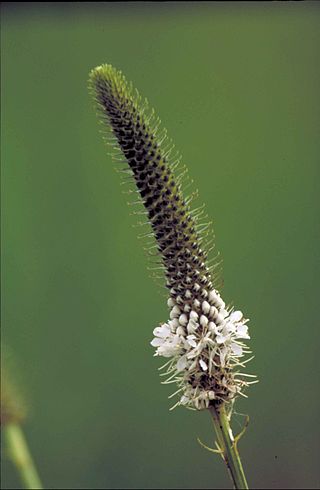
Dalea is a genus of flowering plants in the legume family, Fabaceae. Members of the genus are commonly known as prairie clover or indigo bush. Its name honors English apothecary Samuel Dale (1659–1739). They are native to the Western hemisphere, where they are distributed from Canada to Argentina. Nearly half of the known species are endemic to Mexico. Two species of Dalea have been considered for rangeland restoration.
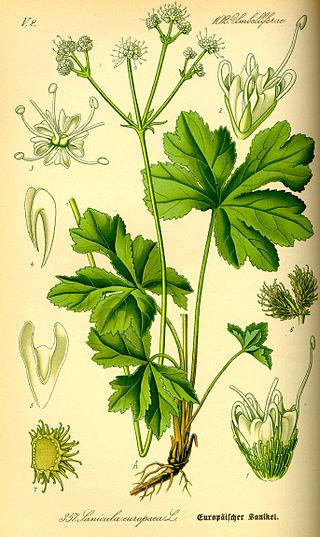
Sanicula is a genus of plants in family Apiaceae, the same family to which the carrot and parsnip belong. This genus has about 45 species worldwide, with at least 22 in North America. The common names usually include the terms sanicle or black snakeroot.
Lecointea is a genus of flowering plants in the family Fabaceae. It contains seven species native to the tropical Americas.

Phaedranassa is a genus of South American and Central American plants in Amaryllis family, subfamily Amaryllidoideae.
Cotopaxia is a genus of flowering plant in the family Apiaceae, comprising two species.
James Francis Macbride was an American botanist who devoted most of his professional life to the study of the flora of Peru.
Mildred Esther Mathias was an American botanist and professor.
Weberbauera is a genus of flowering plants in the crucifer family Brassicaceae, native to the central Andes; Peru, Chile, Bolivia, and Argentina.
Eremocharis is a genus of flowering plants belonging to the family Apiaceae.

Mathiasella is a monotypic genus of flowering plants belonging to the family Apiaceae. It is in the Tribe Selineae. The genus only contains one known species, Mathiasella bupleuroidesConstance & C.L.Hitchc.
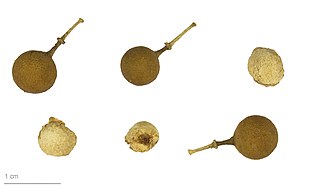
Meeboldia is a genus of flowering plants belonging to the family Apiaceae.
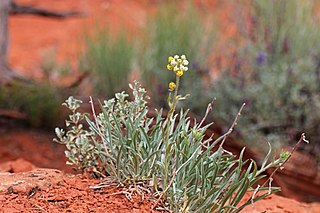
Oreocarya is a genus of flowering plants in the family Boraginaceae. There are about 63 species and its native range extends from western and central Canada, through western United States to north Mexico. It is part of subtribe of Amsinckiinae.
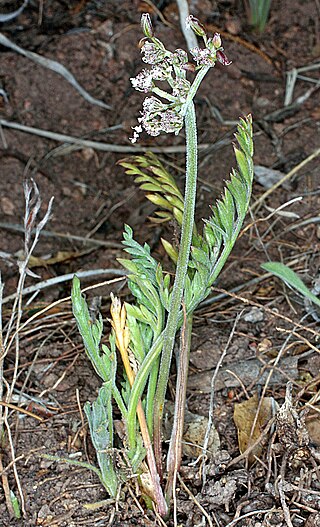
Lomatium orientale, commonly known as salt-and-pepper, eastern cous, eastern desert-parsley, eastern lomatium, white-flowered desert-parsley, oriental desert parsley or Northern Idaho biscuitroot, is a small spring blooming ephemeral plant. It grows in open habitats from the plains to foothills in western North America. It is known as one of the earliest blooming native flowers in its habitat. The species name, "orientale", is botanical Latin meaning "eastern".










